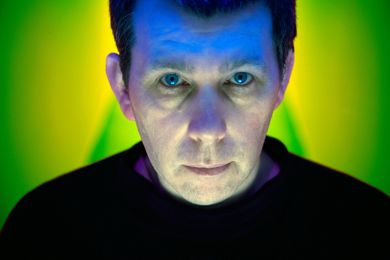Photo by Paul Heartfield
One of the founder members of Throbbing Gristle, Chris Carter is one of the cornerstone figures of British electronic music. His working background was in sound engineering for TV shows including The Old Grey Whistle Test, while he also developed an aptitude for visual effects and multimedia performance. Inspired first by Joe Meek and then prog rockers including The Nice and Pink Floyd, as well as West German experimentalists such as Tangerine Dream, Carter began to create his own electronic works, initially tape manipulations, then building his own synthesisers, when such instruments were unaffordable for most musicians off the shelf. This know-how was vital in a key aspect of his creative process as an electronic music – never fall back on presets, know how machines are wired in order to tear up the wiring.
In the mid-70s, he met Cosey Fanni Tutti, Genesis P-Orridge and Peter Christopherson and put his technical grounding and know-how to avant garde effect, first in the performance art group COUM Transmissions and then Throbbing Gristle. Even within Throbbing Gristle, he encountered resistance to electronics, especially from Genesis P-Orridge, but his grasp of the incipient language of synth music was not only a vital component in the Industrial Music TG sought to inaugurate but also laid a template for the synthpop that would dominate the 1980s. From the vicious, digging loop of ‘Tesco Disco’, the whiplash motif of ‘Discipline’ to the sweetly arpeggiated ‘Hot On The Heels Of Love’, Carter was constructing a bridge from the radical, concrete abstractions of Throbbing Gristle to his post-TG project Chris & Cosey.
Lovers as well as musical partners, early Chris & Cosey releases glow with the liberation of the duo from the oppressive and even abusive atmosphere of Throbbing Gristle, as documented by Tutti in her autobiography Art Sex Music. However, while Carter’s love of John Barry shows a sweet musical tooth and their 1983 single ‘October (Love Song)’ could easily have sat well alongside The Human League and Depeche Mode in the charts, Chris & Cosey retained an exploratory, even industrial element in their work, alongside their dance component, while continuing to explore, dark, transgressive subject matter. Indeed, following a collaboration with The Eurythmics and a glimpse into the world of pop that afforded, they made a conscious decision actively to avoid chart success and all the compromises that would entail.
Come the 21st century and not only do they join a reformed Throbbing Gristle but recast themselves as Carter Tutti, teaming up with Nik Colk Void to release the acclaimed Transverse album in 2012. This was non-functional dance music, imposingly, remorselessly, seductively abstract, with Carter laying the groundwork for Tutti and Void to emit wordless exclamations and acidic instrumental outbursts.
Carter said recently that he and Tutti have “never been busier”, despite lockdown. He has recently revisited his Electronic Ambient Remixes series, reworkings of some of his earliest solo work, teasing up entirely new material from elements of the originals. He’s more than kept pace with times – like his hero Joe Meek, he still hears new worlds.
The latest in a series of Chris Carter reissues on Mute, Electronic Ambient Remixes One and Three, are out on 3rd September. Find out more on the Mute website and Carter’s Bandcamp. To begin reading Chris Carter’s Baker’s Dozen, as written by Carter himself, click the image of him below



